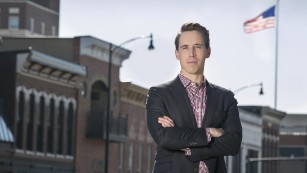(CNN) - April 3, 2017
More than 150 years after Lincoln's Emancipation Proclamation, slavery is illegal almost everywhere. But it is still not abolished -- not even here, in the land of the free. On the contrary, there is a cancer of violence, a modern-day slavery growing in America by the day, in the very places where we live and work. It's called human trafficking. The time has come for a new abolitionist movement to confront this oppression and turn it back.
More than 150 years after Lincoln's Emancipation Proclamation, slavery is illegal almost everywhere. But it is still not abolished -- not even here, in the land of the free. On the contrary, there is a cancer of violence, a modern-day slavery growing in America by the day, in the very places where we live and work. It's called human trafficking. The time has come for a new abolitionist movement to confront this oppression and turn it back.
Each year, thousands of people, usually women and girls, are deceived, threatened or simply forced into commercial sexual exploitation. That is, they are forced to provide sex for money. Don't be misled, this isn't a crime confined to exotic locales. It happens all the time, even in a neighborhood near you. Sex trafficking occurs when a young woman is forced into prostitution at a truck stop; when a sexual predator lures a teen on the internet; when a family member makes a child sell sex for cash.
The International Labor Organization estimates that 4.5 million people are trapped in commercial sex exploitation worldwide, 98% of them female. Since 2007, the National Trafficking Hotline in the United States has received more than 31,000 reports of trafficking happening in this country. Nearly 2,000 calls to the NTH have come from my home state of Missouri.
Sex trafficking amounts to a form of slavery: It is forced, unchosen labor. Left unchecked, it threatens to disfigure our society. That's a danger I take personally. As attorney general of Missouri, I am my state's chief law enforcement officer. I swore an oath to uphold the rule of law, and that means fighting violence and oppression wherever it exists, especially violence against the poor and vulnerable. The swelling epidemic of human trafficking makes a mockery of the law and its protections. Confronting this evil demands new thinking and decisive new action. And this is my pledge: In Missouri we will act, and we will act now.
Today I am issuing new regulations, which my office understands to be the first of their kind in the nation, that will deploy Missouri's consumer protection laws to target traffickers. It's a bold new approach designed to open a new front in the fight against trafficking.
Traffickers have become adept at evading the criminal laws currently on the books. Those laws can be difficult to enforce, not least because trafficking frequently involves activities committed in multiple jurisdictions and across state lines.
That makes trafficking cases time-intensive for law enforcement, and costly. And the truth is, many local police and prosecutors simply do not have the resources, time, training or manpower to bring a traditional criminal case involving trafficking to trial. The traffickers know it. As one recently boasted to a researcher from the Urban Institute, "You don't get locked up for pimping. Who gets locked up for pimping?"
We need a new approach. Unfair and deceptive business practices have been illegal in most states for decades. Yet traffickers routinely use what appear to be legitimate businesses—massage parlors, bars, nail salons—as fronts for their illegal exploitation. It's the ultimate business scam. As of today, that practice is illegal in the state of Missouri.
Here is how the new regulations will work: If traffickers attempt to use a business in Missouri to mask their criminal enterprise, we will find them out. We will shut them down. And using our consumer protection statutes, we will hold them liable, with both civil and criminal penalties. That goes for anyone involved in the traffickers' enterprise.

No comments:
Post a Comment